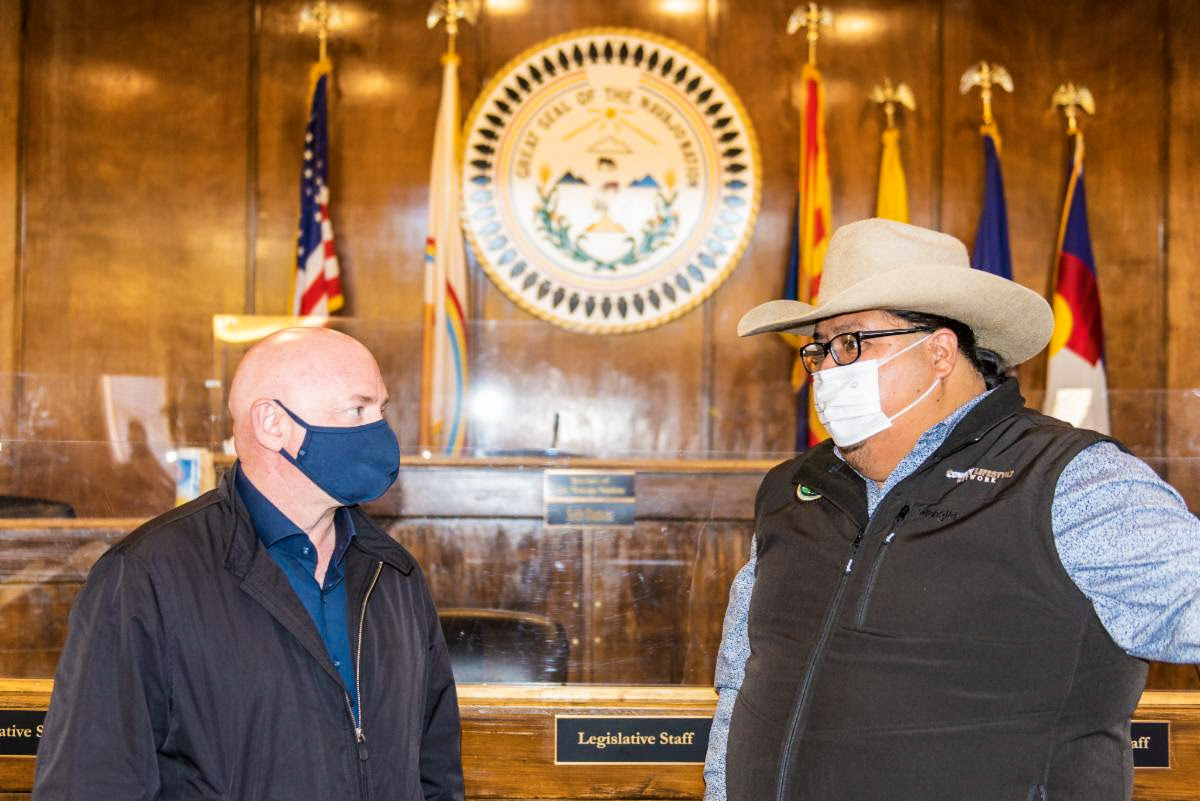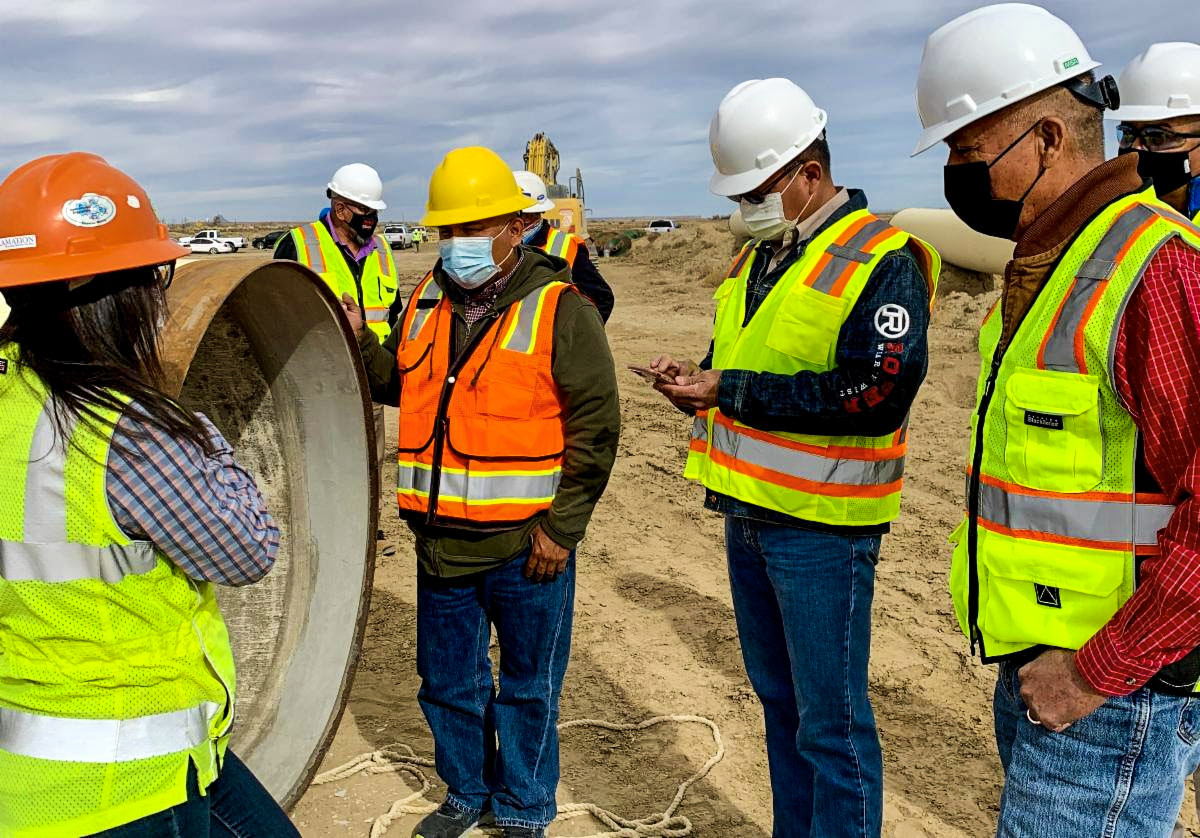
Historic portions of the Infrastructure Investment and Jobs Act include $2.5 billion for tribal water rights settlements, $2.9 billion for tribal transportation projects and $2 billion for tribal broadband initiatives. The Bureau of Indian Affairs alone will be seeing $736 million in funding. “The Bipartisan Infrastructure Deal’s investments will directly support community led transitions for the most vulnerable tribal communities,” Assistant Secretary for Indian Affairs Bryan Newland said on a conference call with reporters on Wednesday. “More than $216 million will help tribes with climate adaptation, planning, ocean and coastal management, planning, and capacity building,” said Newland, a citizen and former president of the Bay Mills Indian Community, based in Michigan. “That money will also help directly fund relocation efforts, managed retreat and protected in-place planning.”The Bipartisan Infrastructure Deal provides $736 million for the Bureau of Indian Affairs, including investments for tribal infrastructure projects and tribal climate resiliency initiatives. #BID #DOI #BIA #TribalInfrastructure #TribalResiliency https://t.co/PbfOVjzuid
— indianz.com (@indianz) November 10, 2021
“The deal also makes historic investments in physical infrastructure in tribal communities,” added Newland, who was confirmed to his political post at the Department of the Interior in August. “It includes $250 million for construction, repair improvement, and maintenance of irrigation and power systems, dam safety, water sanitation, and other facilities on tribal lands. These investments will directly help tribes upgrade their aging infrastructure that is at risk of threatening the health and safety of their communities.”

Passage of the new version of the bill was delayed in the House of Representatives as Democrats considered ways to secure approval of an even larger package known as Build Back Better Act that also includes historic investments for Indian Country. After the approach was abandoned, a final vote on H.R.3684 took place on November 5. The roll call in the House was 228 to 206, with all but six Democrats voting in favor of the measure. The bill also gained support from 13 Republicans, including Rep. Don Young (R-Alaska), the Republican leader of the House Subcommittee for Indigenous Peoples of the United States. “In conjunction with hard infrastructure, this bipartisan bill will fund projects of great importance to Alaska,” Young said of the bill, which the all-Republican Alaska delegation in Congress supported. “The COVID-19 pandemic shined a spotlight on the need for fast and reliable broadband access. I welcome the bill’s investments in our state’s rural broadband connectivity, and I am confident that students, businesses, and families will benefit greatly from this broadband funding.” “I am especially glad that our Alaska Native communities will receive needed support to bolster their own transportation programs,” said Young. “This is especially critical as they work to recover from the devastation caused by the pandemic.”Thank you @repdonyoung, @lisamurkowski and @SenDanSullivan for voting for the passage of the historic #InfrastructureBill. #WinforAlaska pic.twitter.com/N2WqIkoEmp
— Alaska Chamber (@alaskachamber) November 8, 2021
With Secretary Haaland at his side for a Cabinet meeting at the White House on Friday afternoon, President Biden said he looked forward to signing the bill into law on Monday. Haaland was just one seat away from the president at the meeting. “The American people sent us here to deliver. The American people sent us here to make the government work,” Biden told reporters. “And they sent us here to make a difference in their lives. And I believe we’re doing that.” The National Congress of American Indians has provided a detailed analysis of the Infrastructure Investment and Jobs Act and how it impacts American Indians, Alaska Native and Native Hawaiians. In addition to direct investments in Indian Country, NCAI said tribal governments will be eligible for $146.3 billion in federal grant programs. “Tribal Nations and NCAI have long called for a comprehensive and transformational investment in infrastructure in Indian Country,” a summary of the package reads. “For decades, chronic underinvestment and an ever-growing backlog of critical infrastructure projects has negatively impacted the social, physical, and mental wellbeing of tribal and neighboring communities, hampering the ability of tribal Nations to fully leverage their economic potential and the ability of their citizens to fully participate in the American economy.”Late last night, I proudly voted in support of the Infrastructure Investment and Jobs Act, commonly referred to as the bipartisan #infrastructure bill. I want to take a moment to update you on why this legislation is so crucial to Alaska. [🧵THREAD] pic.twitter.com/GK9QhrWnOU
— Rep. Don Young (@repdonyoung) November 6, 2021
The House has passed the Infrastructure Investment and Jobs Act, a historic bill that includes approximately $15 billion in tribal-specific funding. It will now head to the President’s desk to be signed into law.
— National Congress of American Indians (@NCAI1944) November 6, 2021
Read NCAI’s detailed analysis: https://t.co/yHZupDm1Cc pic.twitter.com/n1aqLzJkv6
Native America Calling: Tribal museums reflect on tumultuous year, chart their next steps
Press Release: National Museum of the American Indian hosts Native art market
AUDIO: Sea Lion Predation in the Pacific Northwest
Native America Calling: Tribal colleges see an uncertain federal funding road ahead
Native America Calling: Short films taking on big stories
Native America Calling: Advocates push back against new obstacles to Missing and Murdered Indigenous Relatives momentum
Native America Calling: For all its promise, AI is a potential threat to culture
NAFOA: 5 Things You Need to Know this Week (November 24, 2025)
Chuck Hoskin: Cherokee Nation invests in rural transportation
Native America Calling: Native candidates make strides in local elections
National Congress of American Indians returns incumbents and welcomes newcomers to leadership
National Congress of American Indians chooses leadership at big convention
‘Not voting is still a vote’: Native turnout drops amid changes in political winds
Native America Calling: Indigenous voices speak up, but have little clout at COP30
More Headlines